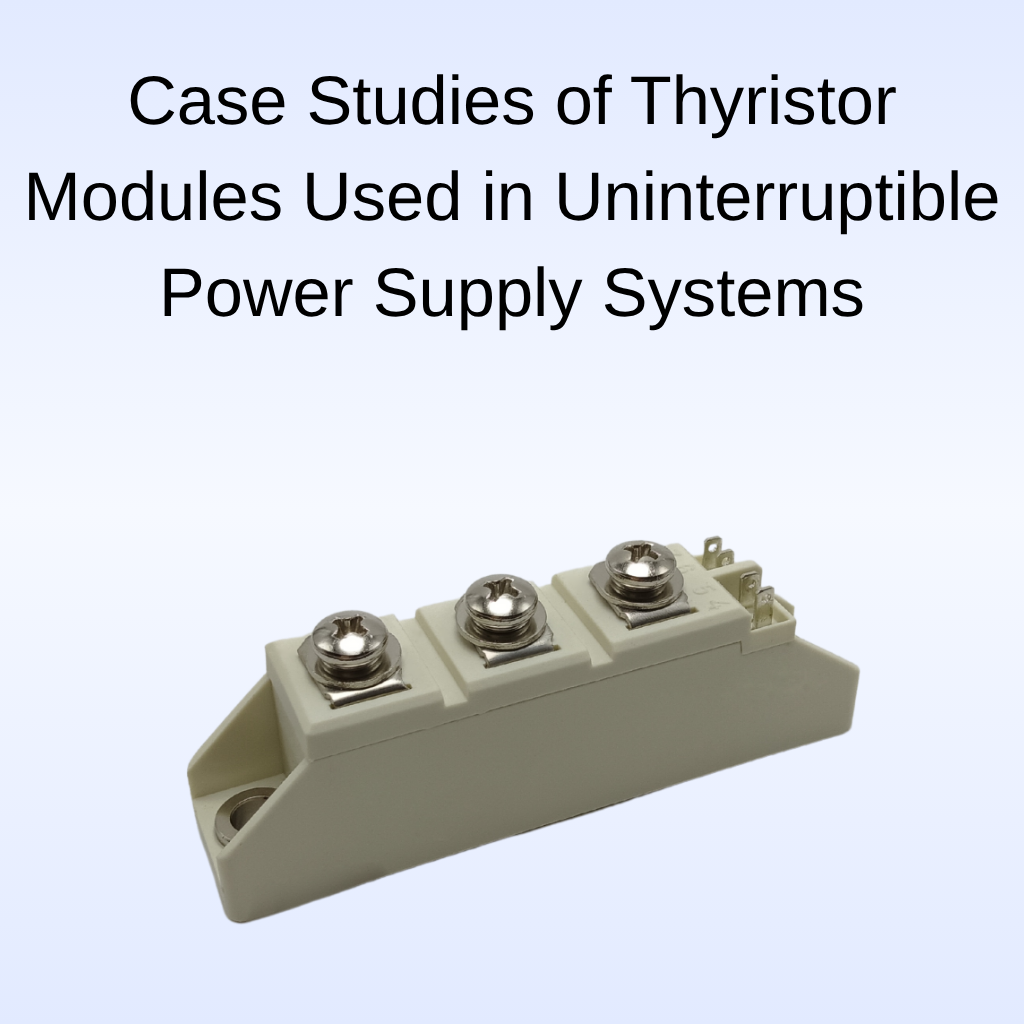Case Studies of Thyristor Modules Used in Uninterruptible Power Supply Systems
Uninterruptible Power Supply (UPS) systems are crucial in maintaining the constant flow of power to critical equipment, especially in industries where power quality and reliability are paramount. The thyristor modules used in UPS systems play a key role in regulating power conversion and ensuring that the systems operate efficiently. This article explores several case studies where specific thyristor modules have been successfully employed in UPS systems, highlighting their advantages in real-world applications.
Understanding Thyristor Modules in UPS Systems
Thyristor modules are semiconductor devices used in UPS systems to control the switching of DC to AC power. These modules regulate the power flow, ensuring a smooth and uninterrupted supply of electricity, even when the grid supply fluctuates. The performance of a UPS system largely depends on the quality of the thyristor modules used. Key features such as high surge current, low on-state voltage, and industrial phase control significantly influence the efficiency and reliability of the UPS system.
Case Study 1: Ultra-Low VT Desalination for Sensitive Environments
In a manufacturing plant where precision equipment operates 24/7, power disruptions can lead to significant downtime and financial loss. The plant upgraded its UPS system to incorporate thyristor modules that feature ultra-low VT desalination capabilities. This feature ensures that the system operates with minimal voltage fluctuations, even in environments prone to power surges. The integration of ultra-low VT desalination not only protected sensitive equipment but also improved the overall reliability of the plant’s power supply. The UPS system was able to handle high surge current efficiently, preventing any equipment damage during abrupt voltage fluctuations.
Case Study 2: Soft-Start Battery Charger for Backup Systems
In a large data center, the constant availability of power is a matter of utmost importance. To ensure seamless power backup during outages, the data center’s UPS system was equipped with soft-start battery chargers and dual thyristor modules. These modules allowed the system to gradually ramp up the power, avoiding the stress caused by sudden power surges. The combination of high surge current tolerance and low on-state voltage ensured that the UPS could handle any surge while minimizing power loss. This setup not only protected the critical servers but also contributed to energy efficiency by reducing the system's operational costs.
Case Study 3: HVDC Power Factor Correction for Industrial Use
An industrial plant that operates heavy machinery found its UPS system struggling with power factor issues, causing inefficiencies in its energy consumption. By upgrading the system to include thyristor modules with HVDC power factor correction, the plant was able to improve the power factor and reduce the power losses associated with non-linear loads. The industrial phase control features allowed the UPS to handle higher loads and reduce fluctuations in the voltage supply. The system’s performance improved significantly, with minimal downtime, thanks to the ability of the dual thyristor modules to handle high surge current demands.
Case Study 4: Temperature Control in a Medical Facility
In a critical medical facility, maintaining a stable power supply to life-saving equipment is essential. The facility’s UPS system was enhanced with thyristor modules that incorporated temperature control and industrial phase control features. The modules were able to manage the temperature of sensitive components within the UPS while maintaining consistent voltage levels. The dual thyristor module design improved the system's overall reliability, while low on-state voltage minimized energy waste. With the inclusion of these features, the medical facility was able to ensure uninterrupted power to its essential equipment, even during peak load periods.
Case Study 5: Smart Grid Integration for Advanced Power Management
A leading research facility adopted a smart grid solution to better manage its power usage and ensure uninterrupted power supply. Thyristor modules designed for smart grid compatibility were integrated into the UPS system. This allowed the system to interact with the smart grid, optimize power usage, and ensure efficient energy distribution. The modules, equipped with high surge current and low on-state voltage capabilities, enabled the UPS to provide reliable power even under varying load conditions. The integration with the smart grid not only improved the reliability of the power supply but also helped reduce operational costs.
Conclusion
These case studies illustrate the various ways in which thyristor modules can enhance the performance of UPS systems across different industries. Features like high surge current, low on-state voltage, industrial phase control, and dual thyristor modules all contribute to improved efficiency, reliability, and energy conservation. By selecting the appropriate thyristor modules, industries can ensure the continuous operation of their critical equipment, even in the face of power disruptions.
READ MORE:
Installation and Maintenance Guide for Thyristor Modules in UPS Systems: Optimizing Performance
Installation and Maintenance Guide for Thyristor Modules in UPS Systems
Case Studies of Thyristor Modules in Uninterruptible Power Supply Systems: Applications in Industry
Best Practices for Selecting Thyristor Modules in UPS Systems

